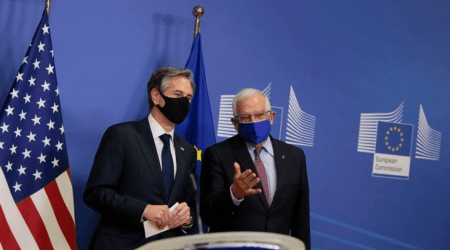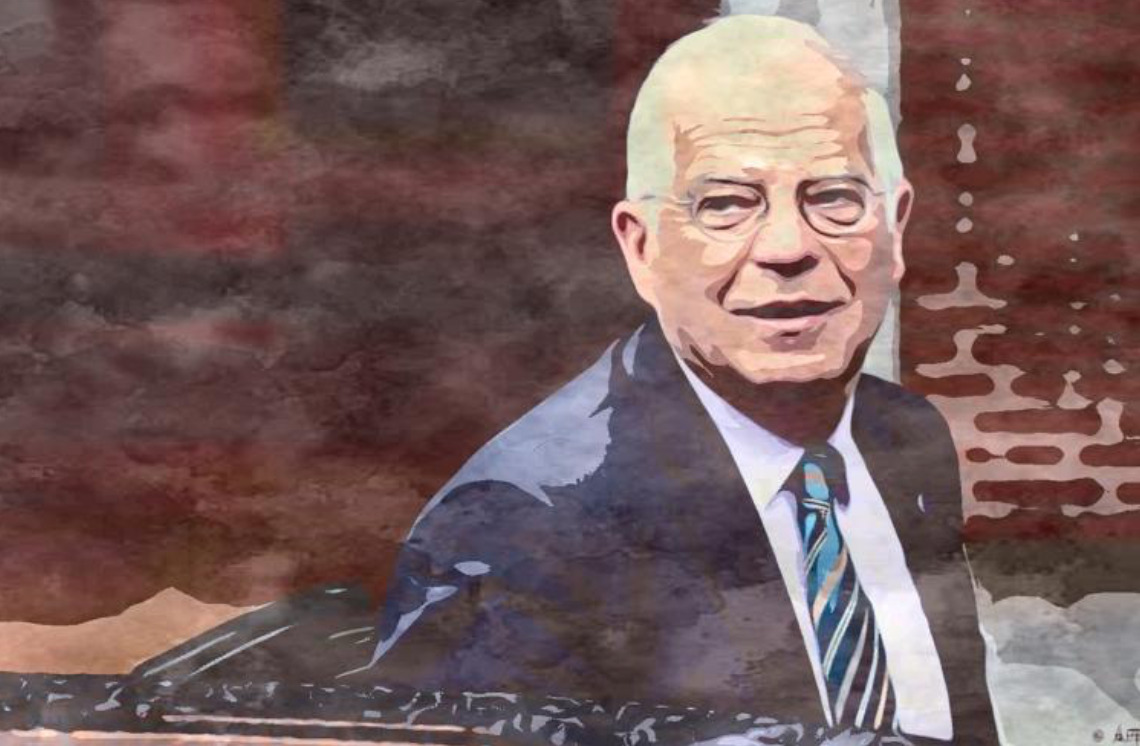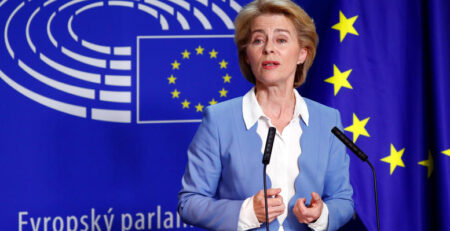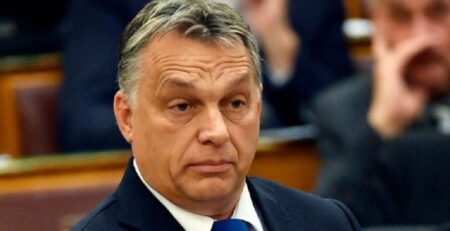Josep Borrell: “Έτος μετάβασης” το 2021
«Οι γεωπολιτικές αλλαγές έχουν ενταθεί με τις πολιτικές εξουσίας να αμφισβητούν επανειλημμένα την ΕΕ και τις αξίες της. Πρέπει να απαντήσουμε με όλη μας την αποφασιστικότητα», αναφέρει ο επικεφαλής της ευρωπαϊκής διπλωματίας.
O Ζοζέπ Μπορέλ τονίζει ότι η ΕΕ δεν στοχεύει να είναι στρατιωτική δύναμη με παραδοσιακούς όρους, αλλά θα πρέπει να είναι σε καλύτερη θέση να μπορεί να αμυνθεί. «Η Στρατηγική Πυξίδα θα πρέπει να εγκριθεί τον προσεχή Μάρτιο και να μας επιτρέψει να λάβουμε πιο σοβαρά υπόψη τη δική μας ασφάλεια και άμυνα», τονίζει.
Σχετικά με την Τουρκία, ο Μπορέλ εκτιμά ότι οι εντάσεις στην Ανατολική Μεσόγειο τείνουν να εκτονωθούν. Συγκεκριμένα αναφέρει: «Η κατάσταση στη Λιβύη φαίνεται να έχει σταθεροποιηθεί, με τις εκλογές να έχουν αναβληθεί ξανά και οι εντάσεις με την Τουρκία στην Ανατολική Μεσόγειο τείνουν να εκτονωθούν φέτος. Το Περιφερειακό Φόρουμ της Ένωσης για τη Μεσόγειο και η Υπουργική Σύνοδος ΕΕ-Νότιας Γειτονίας στη Βαρκελώνη, στα τέλη Νοεμβρίου υπενθύμισαν επίσης την επείγουσα ανάγκη να κλείσει το αυξανόμενο χάσμα μεταξύ των δύο ακτών της Μεσογείου και να αξιοποιηθούν νέες ευκαιρίες για παράδειγμα γύρω από την πράσινη μετάβαση».
Εξάλλου, στην ανατολική γειτονιά, το 2021 παρουσίασε «ξεκάθαρα παραδείγματα πολιτικής ισχύος», όπως στις περιπτώσεις της Ουκρανίας, της Λευκορωσίας και της Μολδαβίας, σύμφωνα με τον Μπορέλ. «Για να αντιμετωπίσει αυτές τις απειλές, η ΕΕ παρείχε πολιτική καθώς και επιχειρησιακή υποστήριξη στους εταίρους της με σταθερό και ενιαίο τρόπο, για παράδειγμα με το 5ο πακέτο κυρώσεων κατά του καθεστώτος Λουκασένκο στη Λευκορωσία. Καθώς οι υβριδικές συγκρούσεις πολλαπλασιάζονται, πρέπει να συνεχίσουμε να υποστηρίζουμε την Ουκρανία ή τη Μολδαβία να αντισταθούν στην πίεση της Ρωσίας και να διατηρήσουμε μια ανυποχώρητη προσέγγιση στη Λευκορωσία. Από την άποψη αυτή, η Σύνοδος Κορυφής της Ανατολικής Εταιρικής Σχέσης επιβεβαίωσε τη στρατηγική, φιλόδοξη και στραμμένη προς το μέλλον προσέγγιση της ΕΕ με τους εταίρους μας στην Ανατολική Ευρώπη».
Για τα Δυτικά Βαλκάνια, ο Ζ. Μπορέλ επισημαίνει ότι «η αύξηση της διχαστικής ρητορικής και των ενεργειών στην περιοχή, ειδικά στη Βοσνία-Ερζεγοβίνη, παρεμπόδισαν τις προσπάθειες να έρθουν οι έξι χώρες πιο κοντά στο ευρωπαϊκό τους μέλλον».

Για τις σχέσεις ΕΕ-ΗΠΑ, ο ύπατος εκπρόσωπος υπογραμμίζει ότι το 2021, υπό τον Πρόεδρο Μπάιντεν, έφερε την επανεκκίνηση των σχέσεων στις δύο πλευρές του Ατλαντικού, δίνοντας τη δυνατότητα να σημειωθεί πρόοδος στην κλιματική αλλαγή, στις διαπραγματεύσειες για τα πυρηνικά του Ιράν και στη φορολογία των επιχειρήσεων. Επισημαίνει, επίσης, ότι «ενώ ο τρόπος με τον οποίο εξελίχθηκε η αποχώρηση από το Αφγανιστάν και η απόφαση AUKUS ήταν ατυχής, στο τέλος του έτους πραγματοποιήσαμε στενές διαβουλεύσεις ΕΕ-ΗΠΑ για την Κίνα και τον Ινδο-Ειρηνικό και επίσης συμφωνήσαμε να ξεκινήσουμε έναν ειδικό διάλογο ΕΕ-ΗΠΑ για την ασφάλεια και την άμυνα».
Όσον αφορά την Κίνα, ο Ζ. Μπορέλ επισημαίνει ότι διατηρήθηκε η ενότητα της ΕΕ, αναγνωρίζοντας ότι η ΕΕ βλέπει τη χώρα ως εταίρο, ανταγωνιστή και συστημικό αντίπαλο ταυτόχρονα. Σημειώνει ως «πλήγματα», την επιδείνωση της κατάστασης των ανθρωπίνων δικαιωμάτων εντός της Κίνας, την περιφερειακή της συμπεριφορά, καθώς και την απόφαση να επιβληθούν κυρώσεις σε ευρωβουλευτές και άλλα επίσημα όργανα της ΕΕ και πιο πρόσφατα τον εμπορικό εξαναγκασμό προς τη Λιθουανία.
Για την Αφρική, ο Ζ. Μπορέλ τονίζει ότι η χρονιά σημαδεύτηκε δυστυχώς από πολλές συγκρούσεις, με την επιδείνωση της κατάστασης στο Σαχέλ και τον εμφύλιο πόλεμο στην Αιθιοπία να λαμβάνει «δραματική διάσταση». Σημειώνει, επίσης, ότι προετοιμάζεται η Σύνοδος Κορυφής ΑΕ-ΕΕ που θα πραγματοποιηθεί τον Φεβρουάριο, όπου η ΕΕ θα πρέπει να εκπληρώσει τις υποσχέσεις της, ιδίως για τα εμβόλια και τη χρηματοδότηση για το κλίμα.
Ο Ζ. Μπορέλ καταλήγει, λέγοντας ότι το 2021 η ΕΕ εργάστηκε για να υπερασπίσει τα συμφέροντα και τις αξίες της και να ενισχύσει μια παγκόσμια τάξη βασισμένη σε κανόνες σε αυτό το έτος μετάβασης -ένα έργο που θα πρέπει να συνεχιστεί και το 2022.

*Διαβάστε το πλήρες κείμενο της ανάρτησης στα αγγλικά
The pandemic has carried on longer than we imagined a year ago and the omicron variant is yet again requiring the introduction of major restrictions and threatening the recovery. Still, we know that vaccines are making a major difference. Thanks to the common purchase mechanism, a majority of Europeans have received at least two doses. The EU has also exported COVID-19 vaccines since December 2020 without interruption. Out of a total of 2 billion doses produced, the EU has exported over 1.1 billion doses to 61 countries and Team Europe has shared more than 385 million doses. The EU has therefore surpassed its target for 2021, which was to share 250 million doses by the end of the year, and the aim of Team Europe is to have donated a total of 700 million doses by mid-2022.
“We need to do more to reverse vaccination disparities and tackle growing imbalances and inequalities.”
Still, unequal vaccination rates across continents underline the need to accelerate donations and develop local vaccine production capacities, especially in Africa. Indeed, while in Europe 60% of the population is fully vaccinated (EU: 68%), full vaccination rates stand at 61% in South America, 56% in North/Central America and the Caribbean, 57% in Oceania, 53% in Asia and only 8% in Africa. On top of these disparities, the pandemic has put a stop to the developing world catching up, leading to an increase in world hunger and poverty, with the number of people falling below poverty line due to COVID estimated at around 150 million by the World Bank. We need to do more to reverse this trend and tackle growing imbalances and inequalities.
In addition to handling the pandemic, we have tended to run from one crisis to the next, with Belarus, Ukraine, Mali, Sudan, Afghanistan, Ethiopia and Venezuela dominating the international and EU agenda. Being in permanent crisis management mode has sometimes weakened our capacity to address transversal, longer-term issues that should be at the centre of our foreign policy, such as revitalising multilateralism, or handling migration in a balanced way, or the energy and climate crises or the rules for the digital transition.
“Being in permanent crisis management mode has sometimes weakened our capacity to address transversal, longer-term issues.”
While in 2021 there were many setbacks and challenges, we also had some positive developments. For example, we were able to present the Strategic Compass to the EU member states. Its purpose is to strengthen the EU’s role as a security provider. Until now, Europeans have too often lived in a ‘security bubble’, despite a fast-worsening security environment. The EU does not aim to be a military power in traditional terms, but we do need to be better able to defend ourselves. The Compass should be adopted next March and allow us to take our own security and defence more seriously.
Another positive example is how EU climate diplomacy played a leading role in the fight against climate change at COP26 in Glasgow. Negotiating with 197 parties implies compromises and the EU played its part, for instance, with the Methane Pledge which it initiated and 100 countries eventually signed.
“The Strategic Compass should allow us to take our own security and defence more seriously.”
2021 also saw the relaunch of EU-US relations under President Biden. The new direction of the US administration enabled us to make progress, for example on climate change, on the Iran nuclear negotiations and on corporate taxation. While the way in which the departure from Afghanistan and AUKUS decision unfolded was unfortunate, at the end of the year we held close EU-US consultations on China and the Indo-Pacific and also agreed to launch a dedicated EU-US dialogue on security and defence.
This year we increased our engagement with Latin America, including inter alia the first high-level EU visit to Brazil in nine years and the inauguration of the EllaLink fibre optic submarine cable between the EU and Brazil. The EU-Latin American and Caribbean Leaders’ meeting of early December should also trigger new developments in the coming months.
On China we maintained EU unity, recognising that the EU sees the country as a partner, competitor and systemic rival, all at the same time. In 2021, the worsening of the human rights situation inside China, its regional behaviour, as well as the decision to sanction MEPs and other EU official bodies and most recently its coercion of Lithuania have all taken their toll.
Overall, we have put the emphasis on diversifying our partnerships across the Indo-Pacific. Our new Indo-Pacific strategy(link is external) promotes EU’s engagement in the region to not only boost trade and investment, but also to cooperate more on security issues, for example maritime or cyber security. My visit to Jakarta in June consolidated our engagement with ASEAN. We have also engaged more closely with Central Asia and started to improve our cooperation with the Gulf countries.
In Africa, the year was unfortunately marked by many conflicts and the overall deterioration of the situation in the Sahel. The civil war in Ethiopia in particular took on a dramatic dimension. We are now preparing the AU-EU summit to be held in February where, as the EU, we will have to deliver on our rhetoric, notably on vaccines and climate finance.
The situation in Libya seems to have stabilised, with elections having been postponed again, and tensions with Turkey in the Eastern Mediterranean have tended to ease this year. The recently held Regional Forum of the Union for the Mediterranean and the EU-Southern Neighbourhood Ministerial Meeting in Barcelona at the end of November were also reminders of the urgent need to close the growing gap between the two shores of the Mediterranean and seize new opportunities for example around the green transition.
“In 2021, we have worked to defend EU interests and values and strengthen a rules-based global order in this year of transitions.”
In our eastern neighbourhood, 2021 featured clear examples of power politics, as we saw in the cases of Ukraine, Belarus and Moldova. To face these threats, the EU has provided political as well as operational support to its partners in a firm and unified manner, for example with the 5th package of sanctions against the Lukaschenko regime in Belarus. As hybrid conflicts proliferate, we must continue to back Ukraine or Moldavia in resisting the pressure from Russia, and maintain an unyielding approach to Belarus. On that regard, The Eastern Partnership Summit reaffirmed EU’s strategic, ambitious and forward-looking approach with our Eastern European partners. The rise in divisive rhetoric and actions across the Western Balkans especially in Bosnia-Herzegovina have also hampered efforts to bring the six countries closer to their European future.
This brief overview of the past year is by no means exhaustive, but I wanted to recall some of the most salient issues. In 2021, we have worked to defend EU interests and values and strengthen a rules-based global order in this year of transitions. That work must continue in 2022 with all the determination we can muster.




